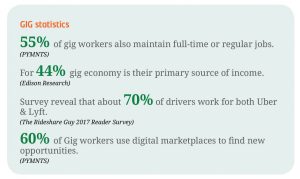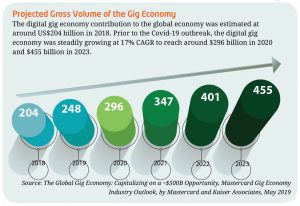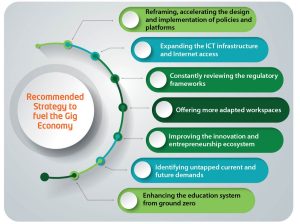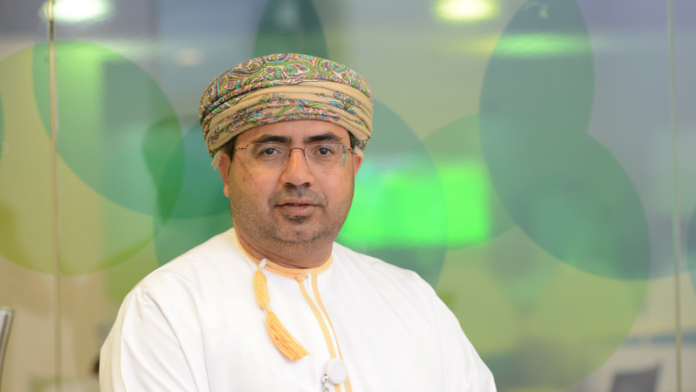Eng. Maqbool Al Wahaibi, Chief Executive Officer, Oman Data Park offers insights on the concept of the gig economy that has been on the rise since the global financial crisis of 2008-2009, and its implications on the future of work, organizations and economies.
The gig economy is a free market system and gig workers are independent contractors, online platform workers or temporary workers. They are usually not employed on a long-term basis by a single firm; instead, they enter into various contracts with multiple firms or individuals for which they are paid a pre-determined sum. There are other terms synonym for gig economies such as platform or freelance economy.
In order to build a robust and scalable gig economy ecosystem, one needs to consider the benefits such models can bring. They will not just help reduce unemployment and contribute to the GDP of nations at the macro level but increase productivity, catalyze demands while inducing lower operational costs for companies. Both organizations and individuals can benefit from services that are agile, convenient and of the highest quality. Simultaneously, the gig workers can benefit from flexibility, increased income and better control over their lives. In recent years, this model has become more popular due to the rapid technological advancements, the emergence of digital platforms and marketplaces offering employers easy access to gig workers.

GIG ECONOMY IN OMAN
In order to promote a gig economy, a requirement is to have a highly efficient legislative system that ensures effectiveness, integrates national capabilities coming from the educational system into the domestic labour market and creating more employment opportunities. For a gig economy to foster and thrive in Oman, certain regulatory and legislative requirements must be taken into consideration. The demand for gig services needs to be encouraged within the organizations through a culture of innovation and acceptance; and awareness and education amongst the labour force. The masses should be aligned to understand the advantages of this model, the long-term benefits, and should be trained to become global citizens by acquiring the skills of the future and skills that are accepted worldwide.
It is imperative for the government to determine the global implications of mentoring the next generations to fit in the new working norms by revisiting the current education framework, and creating regulatory strategies that resonate with the global trends, are not over enforced, and at the same time safeguard the rights of the individuals. The supply and demand cycle needs to be constantly evaluated. A 360-degree change in mindsets, creating an incentive and reward-based gig culture will help increase the productivity of individuals, and address macro issues such as unemployment and low GDP for nations. An hourly wage system and KPIs linked to bonuses have created many gig success stories so far across the globe. Oman too should encourage and adopt this model, and embrace disruption to improve the bottom lines as disruption and risks always lead to innovation and adaptability.
Other factors such as reach and accessibility of broadband internet across the whole country, especially in rural or underserved areas, secured online payment platform that incentivizes users to decrease their reliance on cash payments and cybersecurity measures to create an ecosystem of trust is a must. Addressing all these issues and the development of a robust and scalable gig economy ecosystem would allow the Sultanate to meet the future demand for gig services, and would make the economy even more sustainable and resilient.
Oman Data Park as an organization is continuously supporting the emergence of the gig framework by providing technological support to entrepreneurs and gigs, imparting training and mentorship, building applications and fostering the remote work model. They have collaborated with the system integrators who have been impacted by the pandemic to channel their cloud-based services. Though Oman is a relatively smaller market there is no dearth of talent and skills. It already has a strategy in place for digital transformation and ICT infrastructure as part of the Oman Vision 2040. It is continuously improving its policies and regulatory framework to enable efficient adoption of the gig economy while also protecting the interests of the traditional operating models. There is a constant focus on building its innovation and entrepreneurship ecosystem.

THE GIG ECONOMY ECOSYSTEM
The pandemic has further stimulated the digital gig economy, and the demands in many sectors have created a need for a comprehensive gig economy framework and a continuous review. What comprises the gig ecosystem?

Gig culture
Gig culture refers to a mindset where individuals are no longer tuned to a 9 to 5 job. The gig could either be a primary source of income or could supplement their current income, but for a gig worker, it offers more independence and is a convenient option. The gig economy requires a unique working mindset and more agility. Recent studies have revealed that gig mindset brings to people a sense of freedom, openness, engagement and accountability. People will self-manage and self-direct work, become more networked and take better care of their reputation and personal branding. Managing the gig culture is of fundamental importance, as it will help nations to acquire talent to develop platforms and services.
Leadership
The gig economy comes with new orders and disruption across sectors, thus requiring commitment from the government to build a robust strategy at a very high level. The overarching effect on diverse sectors and the huge impact requires the leadership to expedite the decision-making process and play a pivotal role in managing the shift.
Policies and regulations
Any country while encouraging the gig economy must consider creating policies and regulations, though not stringent. There must be regulations for licensing of gig economy platforms, fair competition, data protection and cybersecurity laws and rules to protect consumers and providers. Continuous assessment of the labour market and provision of access to insurance, healthcare and social security is imperative. Besides, the consumer safety mechanisms should be adapted to suit each sector’s needs.
Digital platforms
While a digital infrastructure to support the framework is a mandate, easy to access and use digital platforms act as gig marketplace. There should be easy connectivity between gig service providers and the consumers, allowing a transparent flow of information.
Innovation and entrepreneurship
Focusing on developing an innovation and entrepreneurship ecosystem, the government needs to create co-working spaces where the gig workers have the opportunity to interact with like-minded people and network. ODP is already offering business support in the form of mentoring, workshops and training and these spaces too can help the gig workers explore and develop their expertise.
GIG SERVICES
Gig services can be offered across sectors via digital platforms. Many services are already covered across a wide range of sectors such as transportation, food delivery, investing, marketplace sharing, to name a few. Uber, Lyft, Airbnb and local players like Otaxi have already adopted the gig model.
COVID 19 & DISRUPTION IN THE GIG ECONOMY
With the pandemic and a looming global economic crisis, many sectors within the gig framework can feel the pressure, including designs, deliveries and rentals. Others like software-based services, banking etc., are unaffected while the service delivery sector has experienced an unexpected boom. The last decade was marked by a huge increase in the number of gig workers, particularly in countries like the US where the number of gig workers in 2018 was estimated at 36% of the workforce and was expected to reach 43% in 2027. By 2027 more than 50% of the US, the workforce will participate in the gig economy according to a study by Upwork and Freelancers Union. India already has a 24% share of the entire gig economy network.
Human behaviour is always impacted by a disruption. When faced with a crisis humans tend to resist change. Slowly they adapt and embrace change, get comfortable. Every disturbance and risk leads to adaptability and innovation. Its human psychology to deal with change in a certain manner. We have observed the same behaviour in coping with the crisis. Adapting to change and improvising is normal in midst of a crisis. While the pandemic has created big opportunities for services providers, it has imposed some challenges for the current operating models that organizations employ; requiring new investments, new policies and procedures, business continuity plans, risk management and rethinking supply chains, changes in work culture and management styles, and creation of new performance management systems and KPIs.
Organizations need to transform their core business processes. Retailers must further engage in online deliveries to reach their customers. Companies can explore the support of emerging technologies like Artificial Intelligence (AI), Blockchain, IoT and others. The crisis has presented many opportunities that innovators and disruptors should be eager to capture and embark on their journey of digital transformation.
A robust digital transformation strategy can lead to –
- Operational efficiency
- Better crisis management
- Customer-centric approach
- Improved bottom lines
Oman too has started implementing the digital transformation strategy in phases, which would eventually be the key enabler to achieve Vision 2040. The aim is to build a digital vibrant society and a gig economy ecosystem; allow the people to become global citizens by acquiring skillsets that will help them evolve as individuals, contribute to the country’s GDP and create the workforce of the future.
To read more about Oman Data Park, click here
Follow Oman Data Park on their Social Media Channels
Twitter, Linkedin and Instagram






